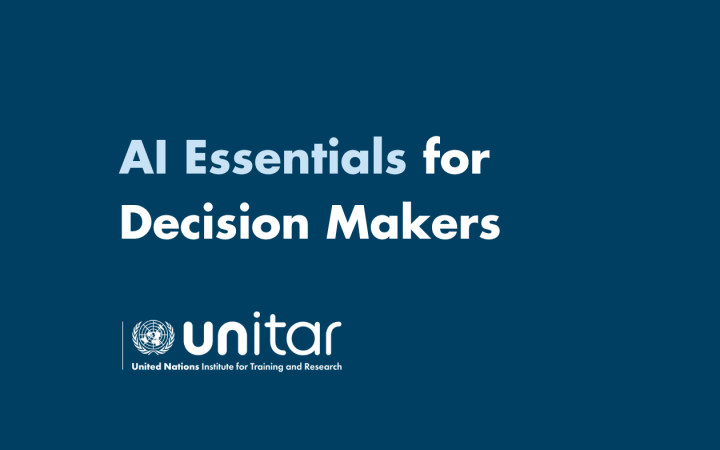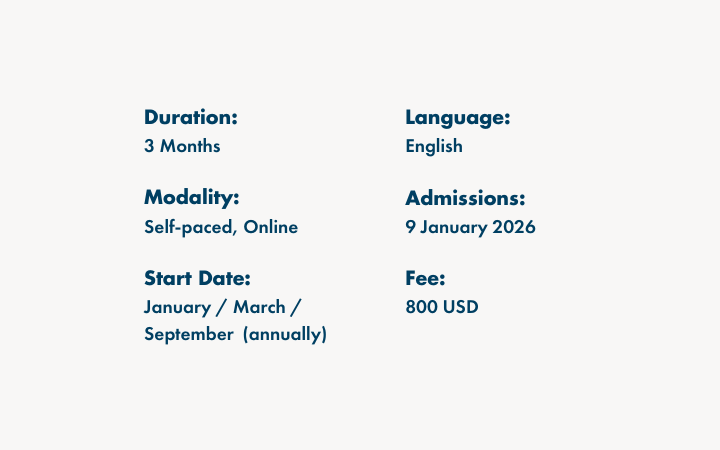Why Take This Course?
Artificial intelligence is rapidly transforming how institutions, governments, and organizations operate. This course equips professionals with the essential understanding and practical tools needed to lead digital transformation responsibly and effectively. It provides a bridge between technical concepts and real-world policy applications, enabling decision-makers to use AI for improved governance, foresight, and institutional performance.
Self-Paced Track
The AI Essentials for Decision-Makers course is offered through three self-paced tracks throughout the year.
Each track runs for three (3) months, during which participants have full access to all course materials and activities, allowing them to complete the programme at their own pace.
- 12 January – 9 March 2026 Register Here
- 16 March – 18 May 2026 Register Here
- 1 September – 2 November 2026 TBC
Background
Artificial intelligence (AI) is accelerating digital transformation across governments, international organisations, and the private sector. Leaders today must be equipped to understand how AI systems function, recognise both their opportunities and limitations, and apply them in support of institutional mandates and public value.
This course provides decision-makers with the essential knowledge required to navigate these technological shifts responsibly. It offers a clear conceptual introduction to AI, explores real-world applications and risks, and strengthens the ability to use data and foresight to inform strategic policy decisions.
Designed for busy professionals, the course is entirely self-paced, allowing participants to learn flexibly while acquiring the competencies necessary for effective and ethical AI leadership.
Learning Objectives
- Explain the foundations of artificial intelligence and digital transformation, including key concepts, systems, and terminology.
- Identify and assess opportunities where AI can enhance institutional workflows, decision-making, and service delivery.
- Evaluate the risks, limitations, and ethical considerations of AI, including issues related to transparency, accountability, and bias.
- Interpret and apply data and analytical insights to support evidence-informed policy development and implementation.
- Integrate foresight approaches and engage confidently with technical experts and stakeholders when planning or supervising AI-enabled initiatives.
Target Audience
This course is open to anyone seeking to better understand artificial intelligence and its relevance to effective decision-making in institutional, professional, or policy contexts. It is particularly beneficial for:
- Diplomats and public sector officials
- Staff of the United Nations, international and regional organisations
- Professionals working in development, humanitarian affairs, and civil society
- Managers, analysts, and advisors involved in digital transformation or innovation projects
- Individuals from the private sector wishing to engage with public institutions on AI-related initiatives
- Students and early-career professionals exploring careers in governance, technology, or international affairs
The course is suitable for both technical and non-technical learners. No prior background in AI is required.
Content and Structure
The course is delivered fully online and at your own pace, allowing participants to balance their learning with professional commitments. The course remains accessible for three (3) months, enabling participants to progress gradually and revisit content as needed.
The programme is structured into five interconnected modules:
Module 1: “Understanding Digital Transformation: Opportunities and Challenges”
Module 2: “Fundamentals and Overview of Generative AI”
Module 3: “Understanding AI Systems”
Module 4: “Intelligence for Effective Policy-Making”
Module 5: “AI in Foresight”
Methodology
This course is delivered entirely online and is designed to provide flexibility for busy professionals. It combines essential theoretical knowledge with practical insights to support immediate application in the workplace.
Learning activities include:
- Short, pre-recorded video lessons presenting key concepts in a clear and accessible manner
- Interactive knowledge checks to reinforce understanding throughout the modules
- Practical examples and case-based reflections connected to real policy and diplomatic contexts
- Downloadable resources and reading materials for continued learning and reference
- Self-assessment quizzes at the end of each module to validate learning progress
Participants may progress through the course at their own pace. Access to the learning platform is granted for three (3) months, allowing learners to complete the course according to their professional schedule and availability.
Additional Information
Participants are granted full access to the learning platform for three (3) months from the date of enrolment, allowing them to complete the course at their own pace.
To earn a UNITAR Certificate of Completion, participants must:
- Complete all modules and associated learning activities
- Successfully pass the final course evaluation
- Achieve a minimum overall score of 75%
- Complete the end-of-course evaluation survey (via SurveyMonkey)
Inquiries and Support
For more information, kindly contact ai.mdp@unitar.org.





